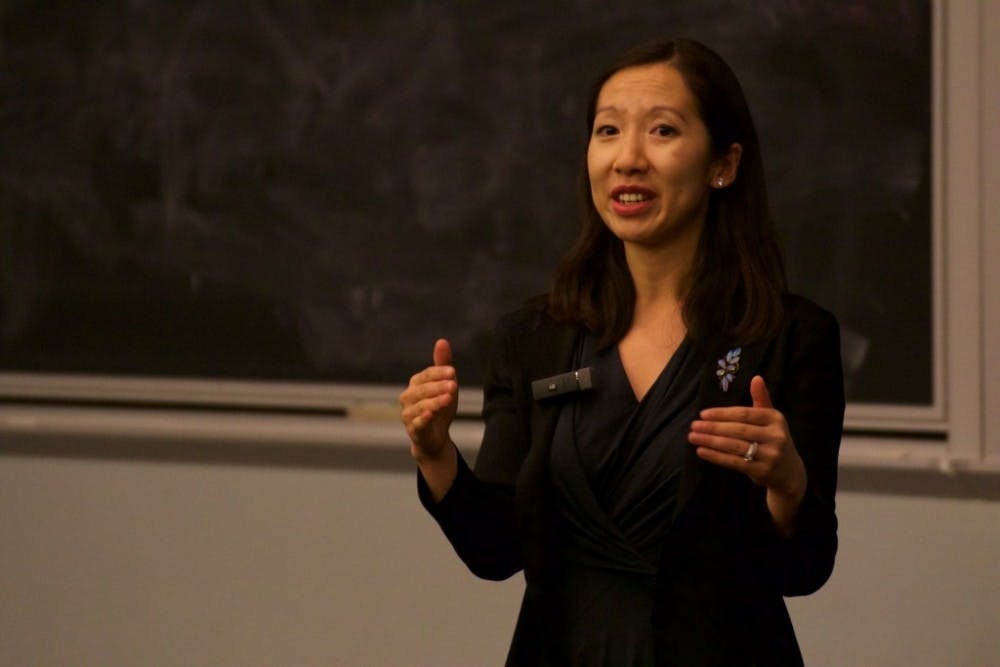Leana Wen, the Health Commissioner of Baltimore City, gave a talk on Feb. 11 as part of the ongoing Conversations in Medicine Symposium (CiM). Wen was the first speaker in this semester’s series, which will also feature two Hopkins professors of medicine and an associate professor in economics from Brown University.
Since she was appointed to the position of City Health Commissioner by Mayor Stephanie Rawlings-Blake in January 2015, Wen has implemented opiate overdose and violence prevention programs. She also managed emergency services and medical assistance during the Baltimore protests, some of which turned violent, last April.
Wen was half an hour late to the event after “dealing with” the Zika virus. During her absence, her special assistant and Baltimore Corps Fellow Gabe Auteri provided a demonstration of how to respond to someone potentially overdosing on opioids. He showed how to administer naloxone (also known under the brand name Narcan), a nasal spray that nearly immediately reverses the effects of opiate overdose.
Under the newly implemented standing order spearheaded by Wen, anyone who is trained on how to administer naloxone can receive a prescription for the drug. Prescriptions for naloxone were handed out after the speech.
Wen said that working as the City Health Commissioner is a dynamic, demanding position.
“You never quite know what you will encounter... you deal with infectious diseases, you deal with Legionnaires outbreaks, measles outbreaks, Ebola. But then sometimes you deal with opioid addiction issues, mental health issues, homelessness issues,” she said.
Wen originally wanted to be an OB/GYN, but changed her mind after working as an emergency room physician at Massachusetts General Hospital.
“It was only until I did a rotation in emergency medicine that I realized that I love that field. I love the trauma, I love the medical emergencies, I love being able to take care of people no matter their age, what they’re coming in for,” Wen said. “I just love the idea of taking care of everyone no matter what they came in with, no matter what the issue is.”
She emphasized the importance of socioeconomic background in effective treatment. She stressed that only a fraction of effective medical treatment occurs in the hospital; the rest lies in prevention.
“What we have to focus on is recognizing that there are so many other things that go on. We can’t just say that a child has asthma, therefore we need to give them an inhaler. We have to look at maybe that child is also living in a house where everybody else smokes,” Wen said. “How can I address that? And, going even deeper, what if that child is homeless? And lives near an incinerator? Can we see providing that family housing as a health solution?”
Wen discussed Baltimore’s plan of action to curb opiate abuse and to lower the number of overdose deaths, which she considers a public health crisis. The number of fatal heroin overdoses in Baltimore in 2014 has more than doubled since 2010, according to The Baltimore Sun.
Instead of jailing addicts caught with drugs, the city will be working on giving them medical treatment.
“I think it’s a huge change in mentality for us when it comes to saying that addiction is a disease, and the best treatment for a disease is mental health treatment,” Wen said. “If you have cancer, you don’t go to jail, so why should you go to jail if you have a disease that alters your brain chemistry the same way brain cancer might?”
Wen wants to take advantage of the attention that was thrust onto Baltimore’s heroin problem.
“People in Baltimore City — African Americans, living in the inner city of a lower socioeconomic class — have been dying of overdose for a long time,” she said. “Why is it now that white suburban people in who knows where are dying, why is it that we suddenly care? This is a big problem. I’m glad that we’re finally focusing attention on this issue.”
After the speech, there was a question-and-answer session during which Wen answered questions on the intersection of public health and policy, the successful implementation of public health initiatives, combating lobbyists and improving communication by medical professionals.
Senior Gabriella Miller, a CiM speaker-relations committee member, explained why Wen was chosen to come speak.
“[She] is a very powerful and inspiring member of the Baltimore city community,” Miller said.
Miller discussed CiM’s theme this year: “What Does It Mean to be a Modern Doctor?”
“The medical field is changing and adapting to today’s society, and we were looking to understand what values and attributes go into making today’s modern doctor so new and so different,” Miller said.
Miller said that Wen fit the theme well.
“We believe in particular that Dr. Wen demonstrates that doctors wear many hats in today’s world. She is both a public health practitioner and physician, she is very much involved in policy work, and she is also so young, so she could do so much more in her career,” she said.
Students reacted positively to Wen’s speech.
“Dr. Wen sounds like an incredible person doing really important things,” alumna Jennifer Wineke said. “And the fact that she was late because she was responding to the first outbreak of the Zika virus in Maryland is the best reason for being late I’ve ever heard. It’s incredible. She seems like a particularly cool lady.”
Junior Saachi Nangia agreed that it was interesting to see how Wen was late because of her work with dealing with reporting the Zika outbreak.
“I really liked that she related it to Baltimore and things that we’ve experienced here on a daily basis,” Nangia said. “I thought it was very cool that she’s dealing with the Zika virus right now.”





